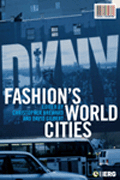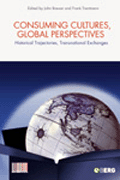
you are here: home > news
|
|||||||||
|
|
|||||||||
|
|||||||||
NEWS |
|||||||||||||||||||||||||||||||||||||||||
Welcome
to the Cultures of Consumption research programme newsletters. Our newsletters provided updates on the latest research and activities in the programme.
Paper dresses, 1967 ©V&A Images/Victoria and Albert Museum, London
|
Research Focus
Multinational Retailers in the Asia Pacific is a research project led by Jos Gamble that explores the transfer of management practices and retail concepts by British and Japanese multinational retailers to their subsidiary stores in China. Overseas firms have rapidly expanded their presence in China since foreign participation in the retail sector was permitted in 1992. This comparative project which involves extensive research in several major Chinese cities as well as of firms' domestic operations in the UK and Japan, analyses the reception by and impact upon Chinese employees and customers of the transferred practices.
For more information:
Jos Gamble
Royal Holloway,
University of London
telephone: 01784 414094
email: j.gamble@rhul.ac.uk
Modes of Consumption and Citizenship and the Welfare State in the UK is led by Martin Powell and Ian Greener. The project examines how public policies in health care, education and housing have utilised discourses based on citizenship, clientism and consumerism since 1945. Research utilises computer software ('T-lab') to present statistical characteristics of key theoretical texts on consumption in the welfare state and policy statements and other key welfare documents which will be supplemented by iterative close readings of the same documents. The two elements will be mapped onto one another, looking to see how theoretical debates on consumption and citizenship have affected policy in the areas examined.
For more information:
Martin Powell
University of Stirling
telephone 01786 467693
email m.a.powell@stir.ac.uk
Liquid Politics charts the formation of the politically self-conscious water consumer in Britain in the modern period. In the nineteenth century, political debates over the rights and responsibilities of water consumers came to the fore at a time of changing modes of access to water, changing habits of water consumption and intermittent failures of supply. In 1880s and ’90s London, ‘the consumer’ was for the first time mobilised as a distinct group in battles between water users, ratepayers and water companies. The project looks at the history behind recent conflicts over drought and waste, and over water quality, pricing, and consumers’ rights and responsibilities.
For more information:
Frank Trentmann
Birkbeck College, University of London
telephone 020 7079 0601
email esrcConsume@bbk.ac.uk
Activities
Baby Boomers in Europe: Patterns of Consumption and Lifestyle from Three Countries was the focus of a seminar at the Royal Society on 10 March 2006. Experts from France, Finland, and the United Kingdom presented new research on baby boomers and the dilemmas they face in everyday life.
For further information:
Rebecca Leach
Keele University
telephone 01782 583 359
email spa13@keele.ac.uk
What Consumers Know: Lessons from New Research on Consumer Perceptions of Food, Motivation, and Ethics was the theme of a seminar jointly organised with the Food Standards Agency on 16 March 2006. The seminar challenged conventional assumptions about the supposed ignorance and motivations of consumers. Researchers presented new findings about how consumers and producers understand food chains, what makes people participate in ‘alternative’ and organic food networks, and about the limits of a consumer identity in ethical consumption.
Contact:
Frank Trentmann
telephone 020 7079 0601
email esrcConsume@bbk.ac.uk
An international workshop Citizenship and Consumption: Agency, Norms, Mediations, and Spaces, was held at the University of Cambridge, 30 March – Saturday 1 April 2006. The two-day interdisciplinary workshop provided a timely forum for current thinking on consumption and citizenship. Experts looked at civil society and governance, media consumption and culture, welfare and public services, and ethics and environment. A collection of papers will appear as Citizenship and Consumption with Palgrave Macmillan in 2007.
For more information:
Frank Trentmann
telephone 020 7079 0601
email esrcConsume@bbk.ac.uk
Countering Consumerism: Religious and Secular Responses A three-day conference on ‘Countering Consumerism: Religious and Secular Responses’ was held in the Graduate Centre, London Metropolitan University, April 20-22nd 2006. Over a hundred participants from the United States and Europe came together to examine secular and religious critiques of ‘consumerist’ culture and the reasons – and rewards – for seeking alternatives to it. The programme, The Guardian article by Jackie Ashley and Kate Soper’s plenary address can be found at:
www.londonmet.ac.uk/research-units/iset/events/
Two edited collections based on papers from the conference are in preparation. (Provisional titles: Shopping at the Shrine: Religion and Consumerism and Better than Shopping).
For further information:
Kate Soper
London Metropolitan University
telephone 0207 133 2761
email k.soper@londonmet.ac.uk
Food and Globalization: Consumption, Markets and Politics in the Nineteenth and Twentieth Centuries was the focus of an international workshop co-sponsored by the Volkswagen Foundation, at the University of Cambridge, 8-10 June 2006. Experts discussed regional and global networks of food, the influence of empires and international institutions, and the role of taste and identity. Food and Globalization: Consumption, Markets and Politics in the Nineteenth and Twentieth Centuries will appear with Berg Publishers in 2007.
For more information:
Frank Trentmann
telephone 020 7079 0601
email esrcConsume@bbk.ac.uk
How financial services and housing wealth influence other dynamics of consumption will be the question addressed by two forthcoming events organised by the research project:
Banking on Housing; Spending the Home
On 7th February the project will launch its key findings. This will be followed by a Think Tank on 8-9th February 2007 at University College, Durham. This international meeting will bring together financial experts and academic researchers from Australasia, Europe and North America to discuss the management of house price appreciation (and price volatility), the use and misuse of housing wealth, and the emerging options for hedging housing risk.
For more information:
Prof. Susan Smith
University of Durham
telephone 0191 334 1946
email susanj.smith@durham.ac.uk
Publications
 Christopher Breward and David Gilbert (eds),
Christopher Breward and David Gilbert (eds),
Fashion's World Cities £19.99.

John Brewer and Frank Trentmann (eds),
Consuming Cultures, Global Perspectives: Historical Trajectories, Transnational Exchanges £17.99
(Oxford and New York: Berg, 2006).
To order a copy of either book visit:
www.bergpublishers.com/uk/home.htm
Jo Littler, Clive Barnett, Kate Soper, Consumers: Agents of Change? Soundings, 31,(2005), pp.147-160.
Janet Newman and Elizabeth Vidler, Discriminating Customers, Responsible Patients, Empowered Users: Consumerism and the Modernisation of Health Care Journal of Social Policy, 35(2)(2006), pp.193-209.
Elizabeth Shove and Mika Pantzar, Fossilisation, Ethnologia Europaea (Journal of European Ethnology), 356(1- 2)(2005), pp.59-63.
Axel Klein, Chewing it Over: The Legal Status of Khat, Drugs and alcohol today, 5(3),(2006).
Lewis Holloway, Rosie Cox, Laura Venn, Moya Kneafsey, Elizabeth Dowler andHelena Tuomainen, Managing Sustainable Farmed Landscape through ‘Alternative’ Food Networks: A Case Study from Italy, Geographical Journal, 172(3)(2006), pp.219-229.
Peter Jackson, Polly Russell and Neil Ward, Mobilising the ‘Commodity Chain’ Concept in the Politics of Food and Farming, Journal of Rural Studies 22,(2006), pp. 129-41.
Lesley Whitworth, Inscribing Design on the Nation: The Creators of the British Council of Industrial Design, Business and Economic History On-Line, 3 (2005)
see: www.thebhc.org/publications/BEHonline/2005/whitworth.pdf
Nick Couldry, Culture and Citizenship: the Missing Link?, European Journal of Cultural Studies, 9(3)(2006), pp.321-339.
Jane Whittle, Housewives and Servants in Rural England, 1440-1650: Evidence of Women’s Work from Probate Documents, Transactions of the Royal Historical Society, 15(1)(2005), pp.51-74.
Bronwen Morgan, Turning Off the Tap, Urban Water Service Delivery and the Social Construction of Global Administrative Law, European Journal of International Law, 17 (2006), pp.215-247.
David Gilbert (guest editor), Special Issue: Shopping Routes: Networks of Fashion Consumption in London’s West End, 1945-79, London Journal, 31(1)(2006).
New Working Papers:
Richard Simmons, Johnston Birchall and Alan Prout, Cultural Tensions in Public Service Delivery: Implications for Producer-Consumer Relationships [working paper no. 26, February 2006].
Simon Biggs, Chris Phillipson, Rebecca Leach and Annemarie Money, Baby Boomers and Adult Ageing in Public Policy: The Changing Relationship Between Production and Consumption [working paper no. 27, May 2006].
Paul Higgs, Martin Hyde, Chris Gilleard, Christina Victor, Dick Wiggins and Ian Jones, From Passive to Active Consumers? Trends in Ownership of Key Goods in Retired and Non-retired Households in the UK from 1968-2001 [working paper no. 28, June 2006].
Ian Greener, Martin Powell, Nick Mills and Shane Doheny, How Did Consumerism get into the NHS? An Empirical Examination of Choice and Responsiveness in NHS policy Documents [working paper no. 29, October 2006].
Matt Watson and Elizabeth Shove, Materialising Consumption: Products, Projects and the Dynamics of Practice [working paper no. 30, October 2006].
For a full list of working papers and programme publications see: http://www.consume.bbk.ac.uk/publications.html
TOP
Links
The Cultures of Consumption research programme seeks to facilitate dialogue between research in academic and public bodies. On this page we will provide you with updates and links to work done elsewhere.
1. I will if you will: towards sustainable consumption. This is the final report from the Sustainable Consumption Roundtable, jointly hosted by the National Consumer Council and Sustainable Development Commission which recommends radical action for government and business in order to help people tackle climate change and environmental problems.
www.ncc.org.uk/responsibleconsumption/iwillifyouwill.pdf
2. The United Nations Environment Programme hosts a creative gallery on sustainability and sustainable consumption advertisements
www.unep.fr/sustain/advertising/ads.htm
3. Patient experience Which? is campaigning for patients’ care to be truly patient-centred. The first part of the campaign focuses on in-patient hospital care. To ensure they are campaigning on the issues consumers care most about, they are asking patients and their carers to tell them what really matters, and to share their experiences – good and bad – of healthcare services.
www.which.co.uk/files/application/pdf/Patient%20 Experience%20final-445-96212.pdf
4. RESOLVE is a new research group examining the links between lifestyles, values and the environment. Based at the University of Surrey and funded by the Economic and Social Research Council, RESOLVE’s aim is to provide robust, evidence-based advice to policymakers in the United Kingdom and elsewhere who are seeking to understand and to influence the behaviours and practices of ‘energy consumers’. Further details of the work programme, aims and objectives can be viewed by visiting the following link:
Previous
Newsletters:
![]()
 'Sixties Fashion' currently on display at the Victoria and Albert Museum, London
'Sixties Fashion' currently on display at the Victoria and Albert Museum, London 